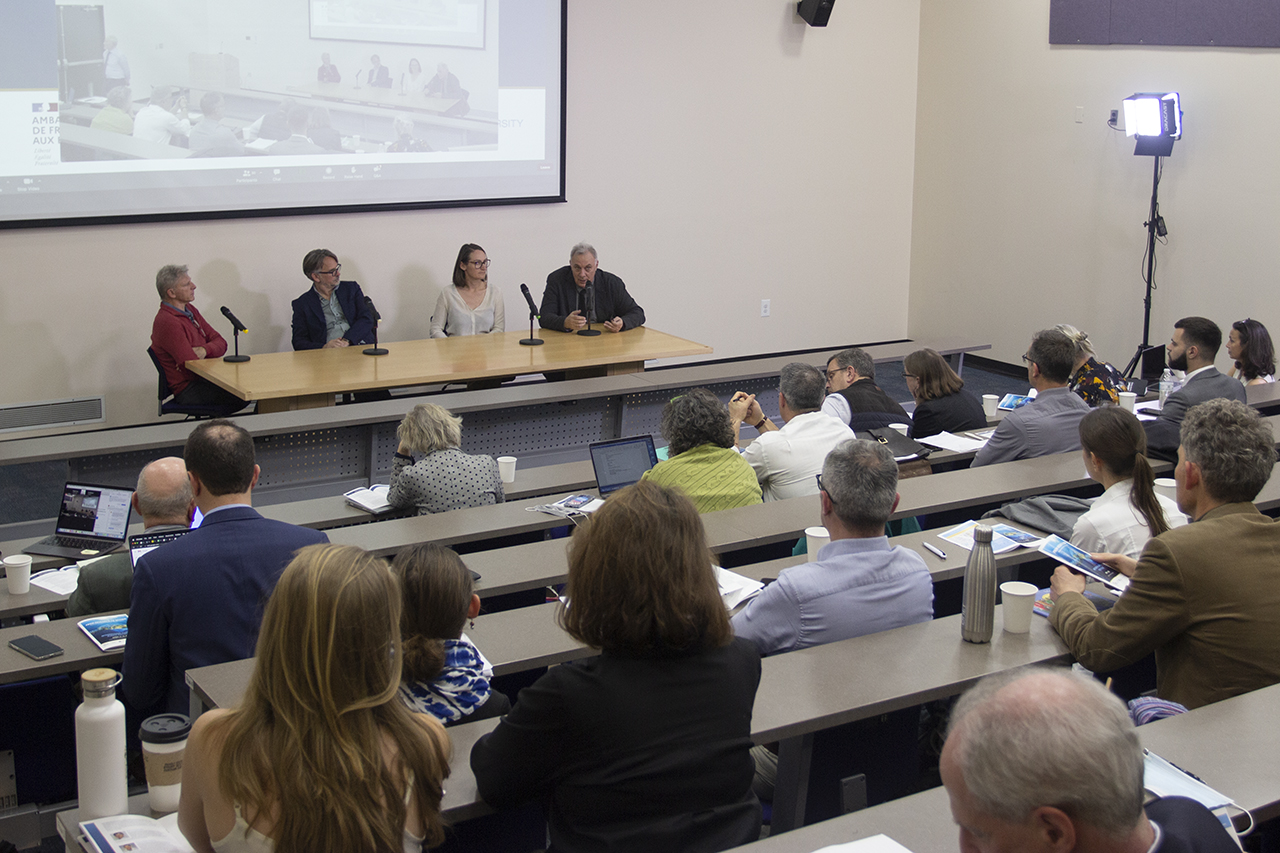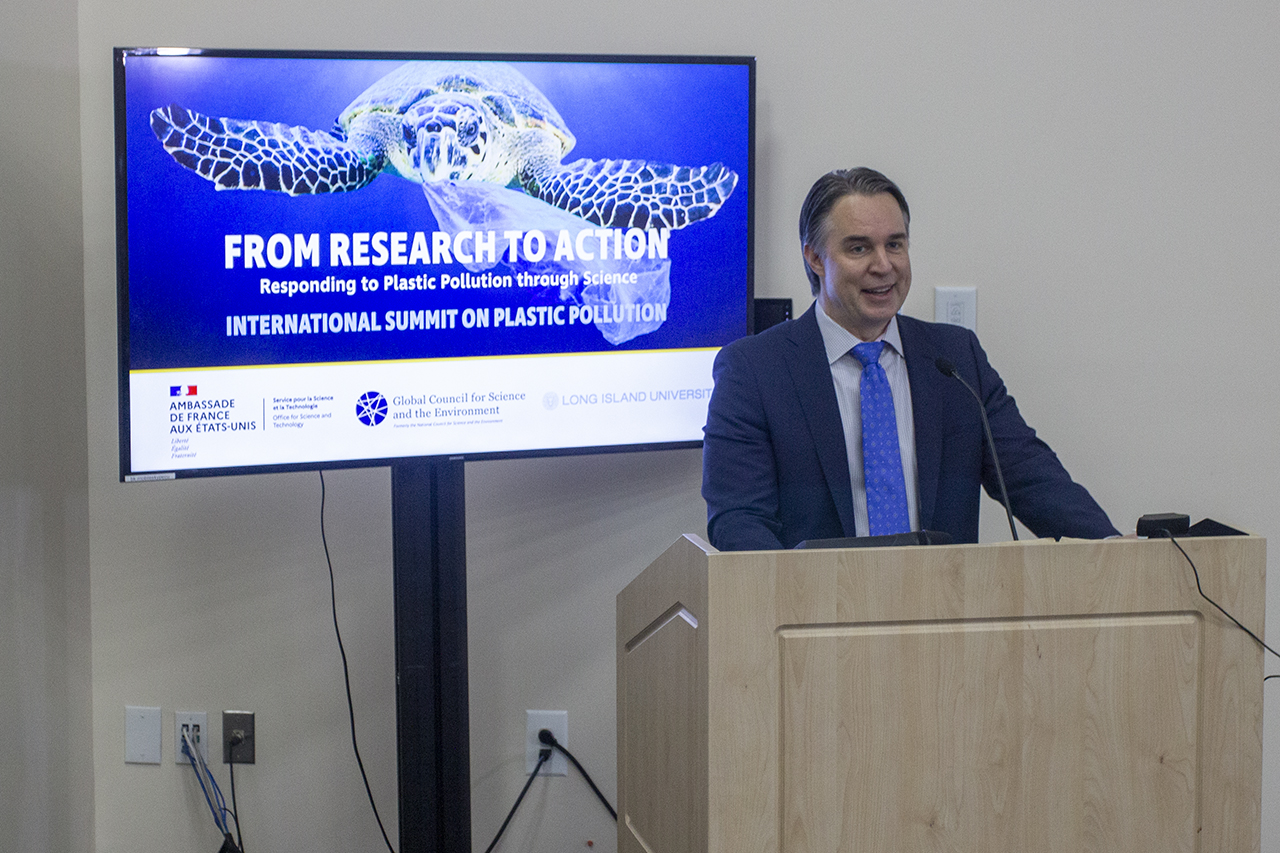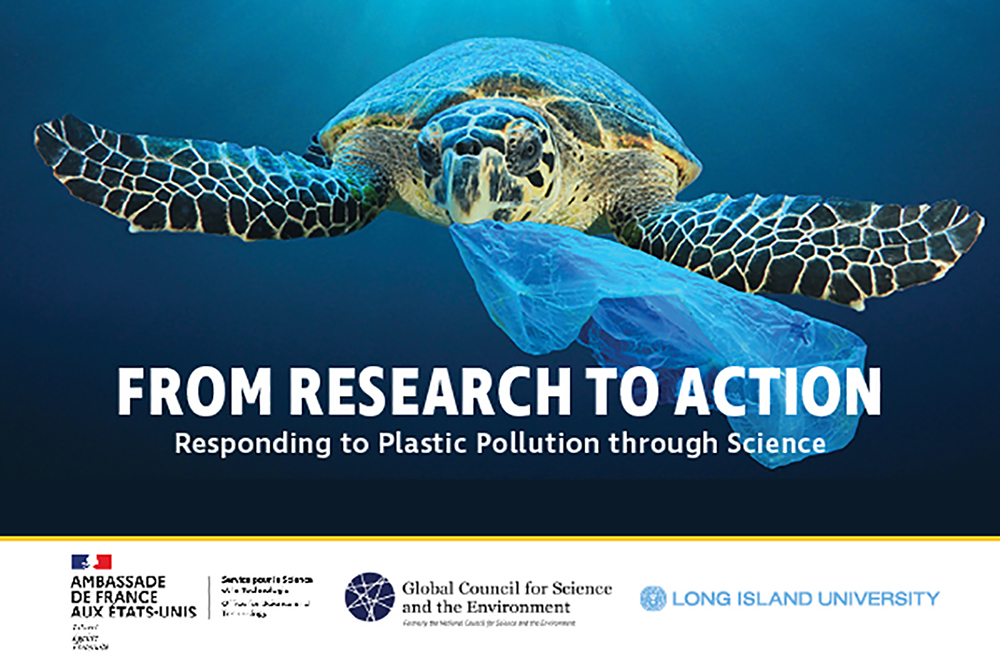Long Island University in partnership with the Global Council for Science and the Environment (GCSE) and the Office for Science and Technology of the Embassy of France in the United States hosted the International Summit on Plastic Pollution: From Research to Action from April 5 to 6 on the University’s Brooklyn campus.
The summit followed the landmark resolution to end plastic pollution endorsed by 175 nations at the United Nations Environment Assembly in Nairobi on March 2, 2022. It is the first summit in North America discussing concrete solutions aimed at reaching the goals of the UN’s proposed agreement.
“Long Island University is proud to partner with leading global institutions and apply our research capabilities to the effort to curb plastic pollution,” said Long Island University President Kimberly Cline. “We are committed to teaching our students that innovation and collaboration have the power to impact the world.”
Long Island University is ranked in the top 7% of research institutions in the U.S. by the Carnegie Classification of Institutions of Higher Education. Its prestigious faculty includes scientists who rank in the top 2% globally of researchers in their chosen field. Dr. Alexander More, director of the Long Island University Honors College, is a world-renowned environmental scientist and fellow of the Royal Geographical Society, and was a primary organizer of the summit.
“Plastic pollution is directly tied to pollution from oil, from which it’s made,” said Dr. More, associate professor of environmental health at Long Island University. “To remove one, we need to remove the other from our economy and ecosystem, and we need to do so for our health and the environment.”

Researchers and policy leaders at the summit traveled from around the world to present groundbreaking innovations for replacing and removing plastics from the global economy, understanding health impacts, and opportunities for governments, research institutions and universities to collaborate and support long-term research initiatives and actionable policy proposals.
“Even if the number of scientific publications on plastic pollution increased exponentially in the last decade, there are still large gaps of knowledge. More transatlantic research collaboration is needed,” said Mireille Guyader, counselor for science and technology at the French Embassy.
Jesse Ausubel, Chair of the Richard Lounsbery Foundation Outpacing Plastic Pollution through Science and Innovation, delivered the keynote address. Among his many accomplishments, Ausubel helped organize the first UN World Climate Conference in 1979, and he initiated the Census of Marine Life, Barcode of Life Initiative and International Quiet Ocean Experiment.
Other distinguished speakers included Senator Angele Preville and Deputé Philippe Bolo of the French Parliament; United States Senator Sheldon Whitehouse; Juliet Kabera, Director General of the Rwanda Environment Management Authority; Amy V. Uhrin, Chief Scientist of the National Oceanic and Atmospheric Administration Marine Debris Division; Muriel Mercier-Bonin, Research Director of the French National Institute for Food and Environment; Eric Chassignet, Director of the Center for Ocean-Atmospheric Prediction Studies; Wolfgang Ludwig, Director of the Centre of Education and Research on Mediterranean Environments; Philip Landrigan, Director of the Global Public Health Program and Global Pollution Observatory; and Paul Mayewski, Director of the Climate Change Institute.

“Plastic pollution is growing at a staggering pace posing challenges to human and ecosystem health,” said Michelle Wyman, executive director of the Global Council for Science and the Evironment. “Cooperation by the scientific community and nations to accelerate solutions and mitigate most especially single-use plastics is imperative to curb the impacts from this growing global threat.
Plastic Pollution is accumulating at an alarming rate in our environment and bodies. Aquatic ecosystems are expected contain three times as much plastic by 2040 if no action is taken. Microplastics have been found in every ecosystem on the planet—from Mt. Everest at the top of the world, to Marianas Trench at the bottom of the ocean—and in March scientists found microplastics in human blood for the first time.
“As researchers our goal is to constantly search for new ways to collaborate and share data that helps inform policy to address the greatest challenges facing society today,” said Dr. Randy Burd, senior vice president for academic affairs at Long Island University. “We are pleased to host some of the world’s foremost environmental science and policy experts to support sustainable solutions for the future.”
About Long Island University
Long Island University, founded in 1926, continues to redefine higher education, providing high quality academic instruction by world-class faculty. Recognized by Forbes for its emphasis on experiential learning and by the Brookings Institution for its “value added” to student outcomes, LIU has a network of over 285,000 alumni, including industry leaders and entrepreneurs around the globe. Visit liu.edu for more information.



